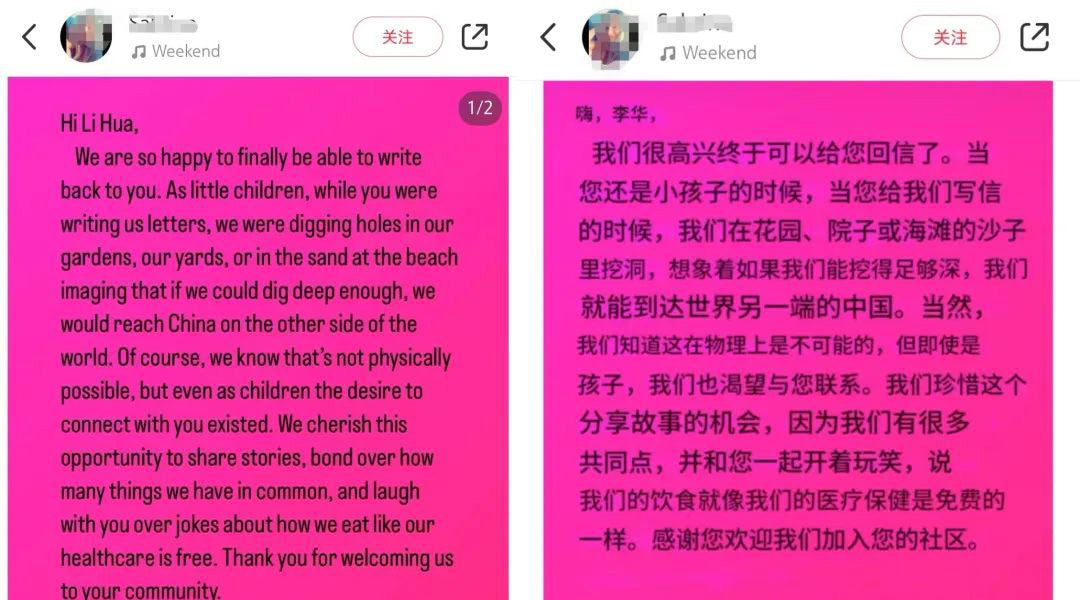
40 Years Later, “Li Hua”Childhood Letters Receive a Heartfelt Reply from the U.S.
CLinaShare
In April 2024, U.S. President Joe Biden signed a bill passed by both houses of Congress, requiring TikTok’s parent company ByteDance to sell TikTok to a non-Chinese company within 270 days. If not, the app will be banned in the U.S. after January 19, 2025. Incoming President Donald Trump is considering issuing an executive order to "pause the forced sale of TikTok for 60 to 90 days" after taking office, in order to allow time for negotiating a solution.
Over the past few days, more than 210,000 posts related to "TikTok" have appeared on Xiaohongshu, with views of related topics surpassing 100 million. In this space, people have broken through language, geographical, and cultural barriers, seeing one another as real, individual people.
One American user commented, "We may not share a common language, but kindness and love are the greatest languages of all."
For some Chinese users, this moment feels especially significant. Since third grade, they have been writing countless English essays using "Li Hua" as their pen name, in the form of letters to foreign friends. Now, after so many years, the "Li Huas" have finally received replies.
In China, almost every student knows one name—Li Hua. For the past 30 years, this name has become synonymous with English composition topics for Chinese students. Whether in the 1995 gaokao (national college entrance exam) English paper or in various mock exams, Li Hua's presence has been ever-present.

About Li Hua
Li Hua is a character that has become a staple in Chinese English exams, often appearing in composition questions since as early as 1995, and even earlier in some regional mock exams. Typically, Li Hua is portrayed as a high school student who serves as the president of the student council. He is known for his helpful nature, active participation in school activities, and impressive English skills. In his essays, Li Hua frequently writes letters to foreign pen pals, sharing stories about his life in China, offering to show visitors around the country. He’s not just academically gifted—he excels in sports too. At home, Li Hua is a responsible child, taking care of his mother when his father is away on business trips, which earns him praise from his father.
The reason why Li Hua is so commonly featured in English compositions has become a bit of a mystery. English teachers often joke that "Li Hua" has almost become a default figure in exam questions. In one of the dialogues in English textbooks, a character named "Lùrén Jiǎ" (a random passerby) was once referred to as Li Hua, but it is particularly in Beijing’s high school exams, such as the first and second mock exams, where Li Hua is most frequently mentioned. Whether students are asked to write a weekly journal, a letter of advice, a school magazine submission, a speech, or even a note, as soon as it’s time to write, Li Hua is sure to appear. Some have humorously speculated that Li Hua’s father might be named Li Lei, and his mother, Han Meimei, based on the consistency and predictability of his name.
According to one teacher involved in writing the exam papers, the name “Li Hua” was chosen simply because it's a common Chinese name, easy to pronounce in both Chinese and English (Li Hua, in pinyin), and not confusing with any English words. However, some students interpret the name more symbolically. “Li” is one of the most common Chinese surnames, and “Hua” represents China, a subtle reminder to never forget one’s roots, even while learning a foreign language like English.
Li Hua Finally Gets a Reply from American Netizens
For Chinese students, their school years wouldn’t be complete without writing a letter to Li Hua, their imaginary foreign pen pal.
But who could have guessed that those clumsy English compositions, scribbled on test papers and homework sheets without stamps, would, decades later, finally receive a reply?
This "cyber fairy tale" is happening for real.
To all the Chinese students who’ve ever written to Li Hua, guess what? Foreign friends are finally writing back!
Right now, no matter where you are or who you are, let’s read together this letter—a reply from a foreign pen pal, decades in the making:

Li Hua, we’ll never call your friendship with foreign pen pals fake again.
After all these years without a reply or face-to-face meeting, they’ve also been learning Chinese, carefully replying in Chinese, character by character:

And even though they’ve never met, those foreign friends used to play in the yard, imagining whether digging through the Earth could bring them to China on the other side?

Foreign friends, is Chinese hard to learn? That’s exactly how we felt when we were trying to learn English back then!

The children who once cried over these letters at their desks are now tearing up at their workstations.

And it’s not just the Chinese netizens who are moved. Foreign netizens who’ve heard about this letter are crying under their covers, too.
And these tears, they say, "Will water the flowers of friendship."
The wonderful encounter between Chinese and American cultures
For China and the United States today, this kind of cross-cultural interaction is of profound significance. Just as Li Hua's letter never received a response 30 years ago, 40 years later, this once ‘unanswered’ topic has finally been answered by real-life interaction.
This cultural dialogue between China and the United States is probably just beginning. In the future, with the rise of more platforms, globalized exchanges will become even more profound and rapid, and Li Hua's story will continue—30 years later, his letter has finally received a reply. And in the days to come, more dialogues and exchanges are waiting to be discovered.